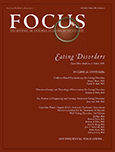From the Guest Editor
Evidence based treatment for the major eating disorders, Anorexia Nervosa (AN), Bulimia Nervosa (BN), and Binge Eating Disorder (BED), is slowly coming of age. Adequate Randomized Controlled Trials (RCTs) have been conducted for BN and BED but are lacking for AN. The problems of medical instability, the need for nutritional and weight rehabilitation, and the egosyntonic nature of AN have created difficulties for RCTs.
In this issue of Focus, Watson and Bulik discuss the evidence based available psychotherapies for eating disorders and innovative psychotherapies under study. Pharmacotherapy and physiological interventions for eating disorders are presented with a categorized evidence based definition by Halmi. With the onset of eating disorders occurring predominately in adolescence, Lock has focused on key factors of diagnosing and treating adolescent eating disorders. Advice for general practice psychiatrists who are referred eating disorder patients but have no special training for this population is provided by Powers.



